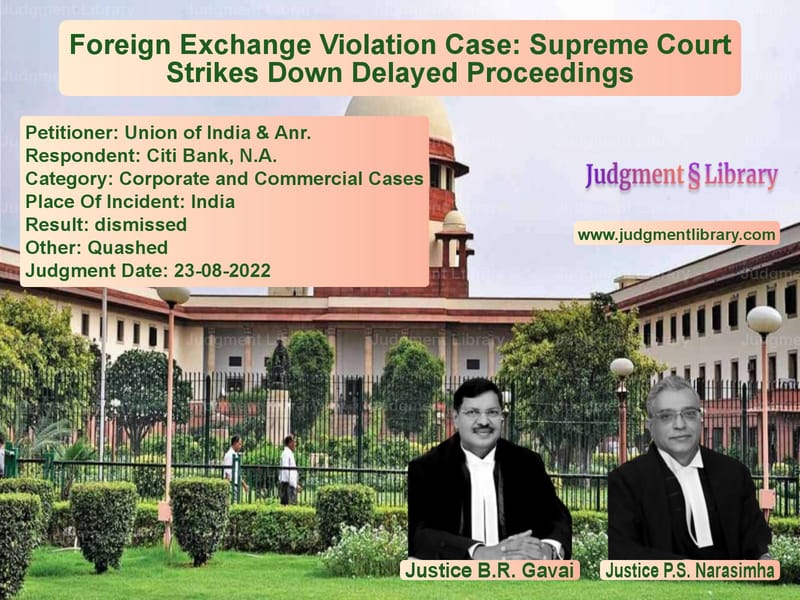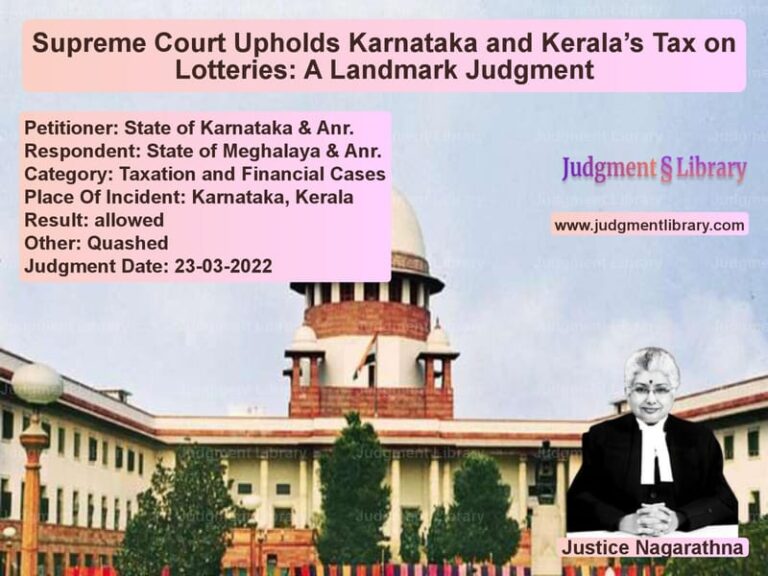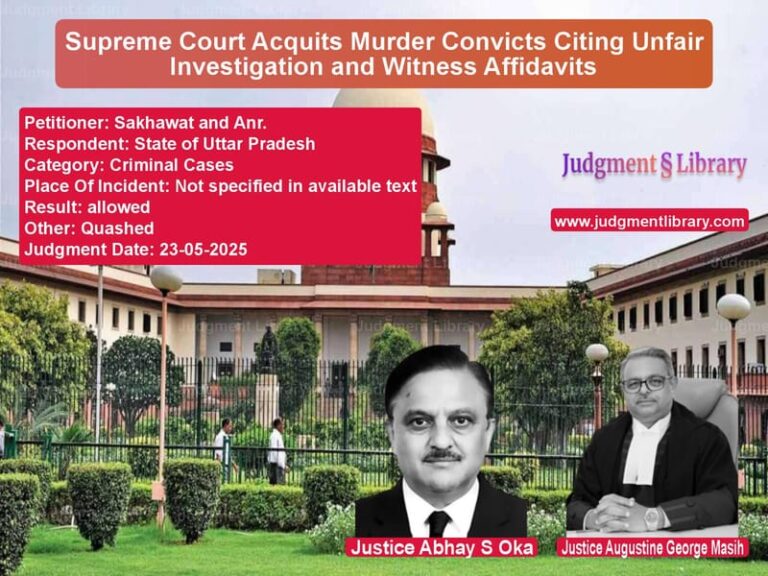Foreign Exchange Violation Case: Supreme Court Strikes Down Delayed Proceedings
The case of Union of India & Anr. vs. Citi Bank, N.A. deals with alleged violations under the Foreign Exchange Regulation Act, 1973 (FERA), involving major banking institutions such as Citi Bank, Standard Chartered Bank, and Bank of America. The core legal issue was whether enforcement actions initiated nearly a decade after the alleged transactions were valid under law. The Supreme Court ruled that such delayed proceedings were untenable and set them aside.
Background of the Case
The Enforcement Directorate issued show-cause notices to Citi Bank and other banks for accepting foreign currency deposits from individuals other than Non-Resident Indian (NRI) account holders. The transactions in question took place between 1992 and 1993, and the notices were issued in 2002—almost a decade later.
The banks challenged these notices before the Delhi High Court, arguing that:
- The restriction requiring only NRI account holders to deposit foreign currency was introduced only on July 31, 1995, through a Reserve Bank of India (RBI) circular.
- At the time of transactions, there was no such restriction, making the notices legally invalid.
- The notices were issued after an unreasonable delay, violating the principle of fairness.
The Delhi High Court ruled in favor of the banks, setting aside the enforcement actions. The Union of India appealed to the Supreme Court.
Legal Issues Before the Court
The Supreme Court had to determine:
- Whether the restriction imposed in 1995 could be applied retrospectively to transactions from 1992-93.
- Whether a delay of nearly ten years in initiating enforcement action rendered the proceedings invalid.
Arguments Presented
Petitioners’ (Union of India’s) Arguments
- The Enforcement Directorate argued that the requirement for NRI account holders to deposit their own foreign currency was inherent under FERA and the Exchange Control Manual of 1987.
- The 1995 RBI circular merely clarified an existing requirement and did not introduce a new rule.
- Authorized dealers, such as Citi Bank, had a duty to conduct due diligence before accepting deposits.
- Under Section 6(4) and 6(5) of FERA, banks had to comply with RBI directions, and failing to do so constituted a violation.
Respondents’ (Banks’) Arguments
- The banks contended that before the 1995 circular, there was no prohibition on individuals other than NRI account holders depositing foreign currency.
- The RBI had itself clarified before the Delhi High Court that such transactions were permissible before 1995.
- The proceedings were initiated after an unreasonable delay, making enforcement actions unfair and legally unsustainable.
- The FERA had been repealed in 2000, and the sunset period for initiating cases under it expired in June 2002.
Supreme Court’s Observations
On Retrospective Application of the 1995 Circular
The Supreme Court, comprising Justice B.R. Gavai and Justice P.S. Narasimha, ruled that the 1995 RBI circular introduced a new condition and could not be applied to past transactions.
“The High Court has rightly held that the Circular dated 31st July 1995, for the first time, made it mandatory that deposits should be made in NRE accounts only by the NRI account holder himself.”
On Unreasonable Delay in Initiating Action
The Court observed that while some laws provide specific time limits for initiating proceedings, others require authorities to act within a reasonable period.
“When the proceedings are required to be initiated within a particular period provided under the statute, they must be initiated within that period. Where no such period is provided, proceedings must commence within a reasonable time.”
The Court relied on precedents such as State of Gujarat vs. Patil Raghav Natha and State of Madhya Pradesh vs. Bani Singh, which held that long delays in initiating legal action can render proceedings invalid.
On the Banking Companies (Period of Preservation of Records) Rules, 1985
The Court noted that banks were required to preserve records for only five to eight years. Since the transactions occurred in 1992-93, the records would have been lawfully discarded by 2002. The Court ruled:
“Permitting show-cause notices and proceedings for transactions that took place more than eight years ago would be unfair and unreasonable.”
Judgment and Its Implications
The Supreme Court upheld the Delhi High Court’s ruling and dismissed the Union of India’s appeals.
- The Court set aside all show-cause notices and enforcement proceedings initiated against the banks.
- The judgment reaffirms that clarificatory circulars cannot have retrospective application.
- It establishes that enforcement agencies must act within a reasonable timeframe and cannot arbitrarily delay proceedings.
- The ruling strengthens the principle of legal certainty and protects financial institutions from unfair retrospective penalties.
Significance of the Judgment
- Prevents Retrospective Punishment: The ruling clarifies that businesses cannot be penalized for actions that were legal at the time they were undertaken.
- Sets Limits on Regulatory Overreach: The decision ensures that authorities act promptly and do not misuse their power to issue notices arbitrarily after long delays.
- Strengthens Banking Stability: By preventing delayed enforcement actions, the judgment promotes confidence in banking institutions and regulatory compliance.
Conclusion
The Supreme Court’s ruling in Union of India & Anr. vs. Citi Bank, N.A. is a landmark judgment in financial law. It upholds the principle that enforcement actions must be timely and that regulatory clarifications cannot be applied retrospectively. The decision reinforces the rights of financial institutions against arbitrary actions and ensures that laws are enforced in a fair and predictable manner.
Petitioner Name: Union of India & Anr..Respondent Name: Citi Bank, N.A..Judgment By: Justice B.R. Gavai, Justice P.S. Narasimha.Place Of Incident: India.Judgment Date: 23-08-2022.
Don’t miss out on the full details! Download the complete judgment in PDF format below and gain valuable insights instantly!
Download Judgment: union-of-india-&-anr-vs-citi-bank,-n.a.-supreme-court-of-india-judgment-dated-23-08-2022.pdf
Directly Download Judgment: Directly download this Judgment
See all petitions in Banking Regulations
See all petitions in Corporate Compliance
See all petitions in unfair trade practices
See all petitions in Judgment by B R Gavai
See all petitions in Judgment by P.S. Narasimha
See all petitions in dismissed
See all petitions in Quashed
See all petitions in supreme court of India judgments August 2022
See all petitions in 2022 judgments
See all posts in Corporate and Commercial Cases Category
See all allowed petitions in Corporate and Commercial Cases Category
See all Dismissed petitions in Corporate and Commercial Cases Category
See all partially allowed petitions in Corporate and Commercial Cases Category







